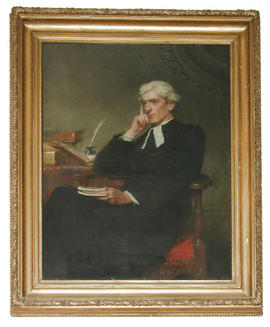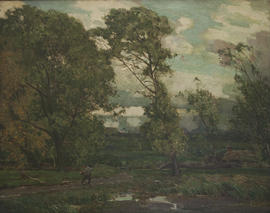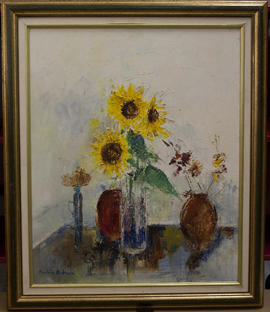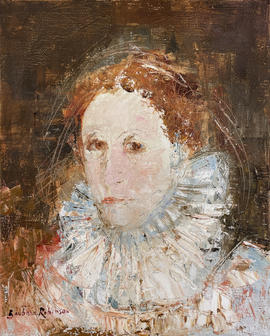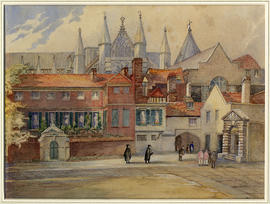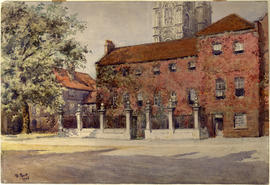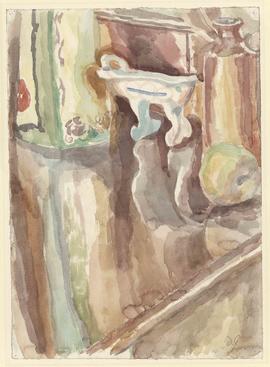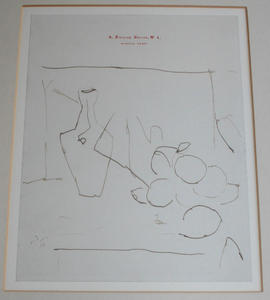Three-quarters length portrait of Rutherford seated on a wooden chair with red cushion; he wears black cassock and white collar; he faces to the left of the picture; his right hand supports his head in an upright position; his left hand holds a book on his knee; to the left there is a table with a quill, book and inkwell. Inscribed with signature and the date of 1903. Attributed to William Robert Symonds (1849-1923) [Sotheby's] or J. Seymour Lucas R.A. (1849-1923) [School].
Source and artist unknown. View from Grant's boarding house Pictures two boysmasters in gowns and mortar boards; two boys in pink jackets and white trousers, with pink hats.
Ashburnham House is covered with Virginia Creeper and has railings outside seperating the front garden from Little Dean's Yard
In pencil on headed notepaper marked 'S. Fitzroy Street, W. 1. / Museum 5596'
Grant, Duncan, 1885-1978Born in Jamaica parents from Barbados moved to England in 1976 when her father came to London to be a medical advisor. Went to school and lived in England before moving to America [00:50]. Joined Westminster, her mother suggested her to apply, found the entry exam interesting and felt deep sense of curiosity [3:30]. Interest in medicine came most likely from her father, thought of Westminster as an intellectual academic coming of age, curiosity driven [6:15]. John Rae, headmaster at the time, made her Head of School. John Rae wanted Westminster to be seen as progressive, and to change the perception of public schools, so by selecting a black female student as Head of School, he was able to pursue this wish. Felt that this was quite well accepted by people inside the school, controversy outside of the school [8:55]. Felt connected to politics and arts by it being at school in central London [12:15]. Westminster created fearlessness, empowered choices and motivated risks and confidence [12:33]. Memory, when John Rae left people threw toilet paper to celebrate and say thank you, done with the nicest spirits. The quiet times as a boarder was tranquil. Boarded in Liddell’s. Thinking of her daughter applying to Westminster [16:28]. Was offered a place at Harvard as an academic and was there as a junior faculty member. Is still there now. The Gates Foundation wanted to build vaccine team, would allow potential influence on public health and health equity which spoke to her roots from a developing country. Helped create MRNA vaccine [19:33]. Supports large efforts in antibody and vaccine discovery and development, makes investments in companies and academics. During the pandemic, had resources that could develop Covid vaccine. Focus on ensuring the vaccine was available for lower/middle income countries, vaccine nationalism made this hard. Hopes to help the marginalised where problems are most inequitable [23:58]. Enjoys outdoor activities. Played Netball at Westminster and was captain. Also played Netball at Cambridge. Played lots of sports, most were sporty at Westminster. The food at Westminster was not great [26:45]. Traditions, champagne breakfast on people’s birthdays. The Christmas carols, assembly in the Abbey was extraordinary and a privilege. Not particularly close with friends from Westminster now due to leaving London [29:11]. Being a girl in the sixth form, only 15 girls in the year, unified in this way, very close. Maturity levels and seeming older than the boys in the year. Now about 60/70 girls that join in sixth form. Race, a lot of friends were Asian, very few Black people. Context of society at the time, found that Westminster was more progressive and did not impact her in negative way. Very happy at Westminster, intellectually interesting, peers very smart and forward thinking. Started as day girl and decided to board in first term [36:45]. Double maths, physics and chemistry at A-level. Diversity at Westminster, not just race and gender but thinking also. Diversity is embraced and cultivates a culture of acceptance [48:34].
Attended St. Paul’s Girls School, lived in different sailing barges on the River Thames in West London [1:20]. Brother went to Westminster, attended Grant’s. Was not happy at St. Paul’s as it was extremely high achieving and stressful. Father died so struggled financially. Was offered a trust to go to Westminster. Uniform, baggy bloomers, white girdle for gym, kilts, white shirts, long grey coats, bowler hats. Uniform very expensive so struggled financially [5:00]. At St. Paul’s, a lot of suicides, the pressure meant you had to be the best of the best, felt insignificant [6:00]. A lot of boys but not many girls. No idea what the reputation was. Had an interview with John Rae. Stepfather had sons who went to Westminster and was very close to them. Had no organised sports for girls other than Judo. Girls felt very safe and sisterly [16:00]. Extracurriculars; many decided to do dance but were naïve about impact that the girls had on the boys. Loved the freedom and confidence of the teachers on expeditions [19:54]. Felt as if the teachers knew you properly. Took English, History and Maths at A-level. Nobody seemed to care about exam grades. Teachers taught in their own styles, very interesting lessons, taught what was interesting to the teachers. Small classes [26:31]. Very liberal school and couldn’t tell if people were extravagant or taking drugs. Unique and eccentric people. Some bullies but when the girls came in sixth form, this was called out. Little prejudice in the classroom and there was a great sense of comfort [31:50]. Oxbridge term, no one really thought to go anywhere else. Missed the interviews for Oxford and it felt like St. Paul’s. Wished to go back to a girl’s college. Got a scholarship, had terrible teaching, not as good as Westminster and was a shock. Got very lazy at Westminster as grades did not really matter [38:10]. Traditions at Westminster, singing in the choir, in a pop group for a charity called “wet music”. Felt that even the “no hopers” were successful [42:29]. Could easily spot someone who attended Westminster. People dressed in a way that was not to be seen as necessarily attractive but unique. Quite fun and theatrical clothing. Uniform at Westminster, people wore what they wanted, but wanted to be seen as part of the school. Reluctant to wear boring clothes [45:33]. Everyone had different experiences of what they were comfortable with. Development of social media changed this perception. Communication in person when Stubbs attended, not a sense of being judged. Felt as if people were kinder. Never felt scared, some of the girls had a harder time, the girls who did sciences and arts were more separated as they did not cross paths [50:33]. Took part in lots of plays at Westminster. Part of a band called Local Heroes [57:42]. In a house of scholars, wished to be a boarder rather than in the house of scholars. Often the extremely bright boys lacked emotional development. Felt the need to mother them. Everyone very smart so under a lot of pressure [59:30]. Food was nice. Ate in College Hall. A lot of tradition. Before eating they said grace with three boys singing in Latin. A lot of tourists. If the Queen was passing you would have to throw your hat in the air. The Greaze, controversy now about girls and the Greaze [01:05:21]. Social media does take over a lot of time, creates pressure around how to act. Being at Westminster and in a community feels more welcoming (because of co-ed or boarding). Was never fully living school life at Westminster. Educational style at Westminster was fresh and exciting. Being a kind person more important than grades. Some felt compelled to be fixated on one path, but this blocks opportunities and closes off possibility. Learnt at Westminster that exam grades do not matter as much as the experiences people make on the way – most significant take away. You do not have to end up as an academic from Westminster. She is not academic but performed well in exams. Would have liked to be a translator [01:19:53]. Had to address the title of what the essay was about multiple times in an essay to get a good grade. Would not be writing like others, desire to be unique in exams was significant. Would write essays in the style of who they were writing about [01:24:41]. Advice for girls at Westminster; important to turn up and care, especially after Covid, being resilient, very special time and special place being at Westminster. Worth cherishing the time you are at Westminster and keep in touch with friends. Important to expose your age group to all the different job opportunities that are available. Felt it was a gift being at a co-educational school [1:30:31]. Very encouraging of people to do what they want to do [01:33:35]. Important to be proactive about what we want to do or be [01:38:22]. Did not appreciate how good the teaching was, and the privilege of attending Westminster. Difficult world now for fear of being inappropriate or from creating their own ideas of teaching. The hardest thing about teaching now would be wanting to teach the full depth of the subject but having to consider that there will be examinations and a syllabus, so depth of teaching is limited. Expectation between private schools and state schools. An advantage to go to Westminster but not as much as it used to be [01:50:02].
